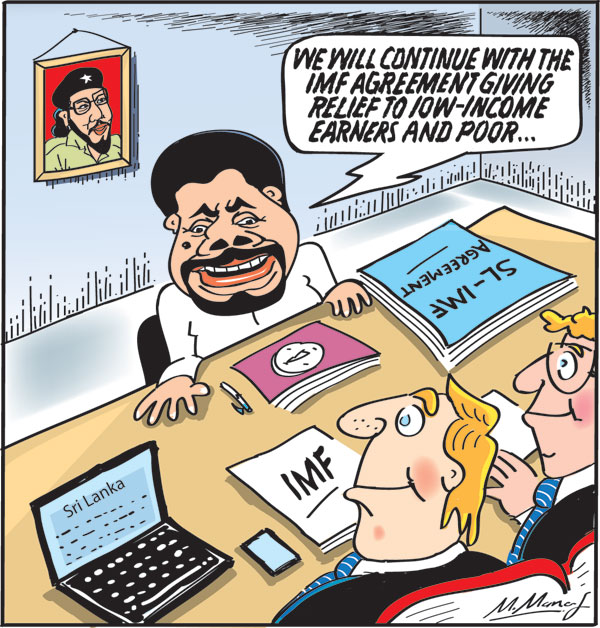Columns
Challenging task of continuing IMF agreement while reducing taxes and enhancing social expenditure
View(s):The President announced that the government would continue with the IMF agreement. He expects to achieve the macroeconomic targets set by the IMF while giving relief to low-income earners and providing assistance to the poor.
This has been a challenging task in the country’s economic and political conditions at the best of times. It is a formidable challenge in the current economic conditions and financial bind.
Policies
The policies to achieve these objectives would perhaps be revealed in the days ahead. It is unlikely that the IMF has agreed to modifications and more time to achieve the fiscal and other targets at their recent courtesy call on the new government.
Review
The progress of the government in continuing the Extended Fund Facility (EFF) is a crucial factor at the next IMF review in December. At present, there are moves by the IMF and the government to work out an acceptable arrangement to continue with the EFF, which is vital for the country’s economic stability and growth.
Fiscal challenge
The immediate challenge the President faces is to achieve a reduction in the fiscal deficit while increasing expenditure on the fertiliser subsidy, social expenditure, and welfare programmes amidst decreasing revenue due to tax cuts. This is no easy task.
Taxes
The government will have to increase revenue if it is to provide relief to low-income earners and the poor, who have been badly affected by increases in prices, reduced employment, and inadequate wages.
A taxation system that ensures higher revenue is essential to not only achieve a lower fiscal deficit but also fulfil many of the election promises, such as enhanced social security, increased expenditure on education and health, and subsidies. Vitally important is a more efficient tax administration that minimises tax avoidance and tax evasion. A progressive system of taxation and new taxes that fall on the rich are needed to increase revenue equitably.

A reduced deficit to conform to the IMF conditions is mandatory for the continuation of the IMF arrangement that is vital to ensure economic stability, international confidence, and attract foreign investments.
Prospect
If the President asks for more than what the IMF could agree to, there is a prospect of the discontinuance of the IMF arrangement, making the economic recovery more difficult. On the other hand, the IMF must recognise the adverse social impacts of its policies and devise policies that achieve macroeconomic goals with equity and social justice.
Policy shift
A significant development in the country’s political economy has been the JVP/NPP policy shift from its leftist policies to a more centrist one. This is of utmost importance for the country’s economic development.
The JVP/NPP’s more moderate stance on the IMF arrangement and their modified stand on privatising loss-making enterprises are indicative of a more balanced approach towards the IMF.
International trade
The government is also mindful of the importance of international trade and foreign investment. The government has stressed that the country’s future lies in being competitive to boost international trade.
Privatisation
Another issue facing the government is the privatisation of state-owned enterprises. The JVP opposed privatisation of national assets. There appears to be a shift in policies to one of selective privatisation. For instance, the new administration is amenable to the privatisation of SriLankan Airlines. On the other hand, it would not privatise state bus or rail transport services but reform them in some manner.
Unlikely
However, without privatisation of a large number of loss-making state enterprises, it is unlikely that the fiscal burden can be reduced or the economy can be guided on the path to rapid growth. How this requirement of the IMF would be met matters for the continuation of the IMF agreement.
Privatisation could also increase government revenue.
Tough tasks
Achieving these objectives simultaneously is a tough task at the best of times. It is particularly difficult in the current economic conditions and committed government expenditures.
Global conflicts
Furthermore, the escalation of the wars in West Asia and Ukraine, trade disruptions, trade wars, and inevitable increases in prices of fuel, food, and fertiliser imports could strain the economy and undermine fiscal consolidation.
Concluding reflection
The economic challenges are formidable. The recovery of the economy from its current fragile state has been compounded by the extravagant promises given in the election manifesto of the JVP/NPP.
The President and the government face unprecedented economic challenges. We are at a crucial moment in the country’s history when a social, cultural, and political transformation could change the destiny of generations to come. The promises of the new president must be implemented to bring about such a transformation of the polity and society. Honesty, meritocracy, pragmatism, and hard work are vital to usher in such a transformation.
The success in eradicating corruption would be a pivotal factor in propelling economic growth. It would also be important not to pursue doctrinaire policies. We must not be burdened by history; we must learn from past experiences. Successive governments have been weak on implementation. Pragmatic economic policies must be effectively implemented.
Let us hope that the five-year term of President Anura Kumara Dissanayake will usher in an honest administration that will bring about a social order with equity, opportunities, and pragmatic economic policies.
Buying or selling electronics has never been easier with the help of Hitad.lk! We, at Hitad.lk, hear your needs and endeavour to provide you with the perfect listings of electronics; because we have listings for nearly anything! Search for your favourite electronic items for sale on Hitad.lk today!


Leave a Reply
Post Comment